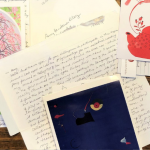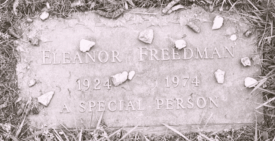I received a postcard from my sister on my first Mother’s Day after giving birth.
She’d sent it from Brazil. It was a postcard for tourists, a beautiful black-and-white image of two boys sitting on a wall looking out to sea. On the flip side, my sister had written, “Happy Mother’s Day. You’re a mother now. And a wonderful mother who did all the right things for her son.” She’d sent it even though my son was gone. He’d died of brain damage at 38 days.

The postcard from Monica’s sister
When I found that postcard recently, preserved amongst condolence cards, I remembered how grateful I felt. Condolence cards matter. People should write them. But so many of them said, “I can’t imagine what you’re going through,” that after a while I’d begun to feel unimaginable to myself. In my grief, who was I? My sister’s postcard brought me back. She saw me as I needed to be seen—as a mother like any other.
Bereaved mothers are everywhere. We’ve suffered miscarriages, stillbirths, and neonatal deaths. We’ve lost children to accidents and diseases. We’ve given up children for adoption, or had our children taken from us in other ways. Though we all grieve differently, we all grieve because we love. The absence of our children doesn’t change that.
So if a mother’s grief feels unimaginable to you, imagine her love instead. Though you may never learn how much it helps, your effort matters. If you’re unsure how to start, here are sevens tip to try:
Related
1. Say Something.
Don’t back away from conversation when you hear the news. I mean this literally. Child-loss isn’t contagious. Come closer. If you’re tongue-tied, try starting with this: “I’m so sorry for your loss.”
2. Ask For Details.
Don’t worry about “reminding” a mother about her loss. She hasn’t forgotten. She’s simply hidden her child from polite conversation. I’ve met mothers who lost children decades before and haven’t had a chance to speak their names in years. Even if her child died in utero, a mother still had expectations, dreams, a bond. If you’re unsure how to ask, try this: “Can I ask you more?”
3. Offer Support.
Even if a bereaved mother seems to be functioning fine, she may still need support—even years later. Grief has no schedule for anyone. For a mother, no matter how much time passes, she’ll always be aware that her child should have outlived her. If the child died very young, she may be the only person in the world carrying that absence. So even if she says she’s fine, try offering your support again.
4. Don’t Say “Everything Will Be Okay.”
Having a child die will always feel wrong. However you make sense of loss for yourself, don’t try to explain her own loss to the mother. Avoid saying things like, “Your child’s in a better place,” “Some babies aren’t meant to be born,” or “Be grateful that you have/will have other children.” Even if she’s religious, she may want to slap you. Just focus on her feelings. Try, “That must be hard.”
5. Be Yourself.
Every situation is different. No matter what you read here, you can still be yourself. That’s why you’re friends in the first place. Laugh. Cry. Be goofy. A mother who’s lost a child doesn’t want to lose whatever she loves in you as well. Even if you haven’t loved as a mother, you must know something about love. If you’re afraid of saying the wrong thing, try this: “I’m not sure if this is the right thing to say, but….”
6. Consult an Expert.
If you’ve read this far, you’re devoted to the bereaved mother in your life. But what if you feel out of your league? In the United States each year, one million women suffer pregnancy and neonatal loss alone. Fortunately, the internet makes it possible to connect with other grieving parents on websites such as Compassionate Friends, Reconceiving Loss, Bereaved Parents of the USA, or The Miss Foundation. Try this: “I’ll always be here for you, but have you thought about turning to others for help?”
7. Remember.
No one misses her child as much as a mother does. But should she be left alone with the memory? 12 years after the death of my firstborn, I have two more boys. Sometimes I’m so busy you’d think I’d forget him. I don’t. So if you’ve avoided talking with a bereaved mother about her loss, today is the day to change that. Try this: “I want you to know I remember…” and use her child’s name. My son’s name was Silvan. Silvan. For all my grief, there is relief in speaking his name aloud.
Monica Wesolowska is the author of Holding Silvan: A Brief Life, named a “Best Book” of 2013 by Library Journal and The Boston Globe. You can read more about her loss and other matters in her New York Times Modern Love column or on her website.
Modern Loss is not a therapeutic adviser; this piece should only be used as a guide. Users should verify the veracity and appropriateness of the information posted on the site with his or her own therapeutic adviser.












